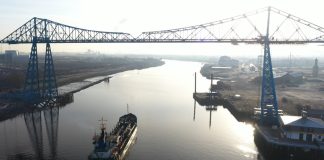The Department for Transport has refused to rule out that nearly £1bn in funding for transport improvements faces cuts in the Budget later this month.
There are fears that the £978m transport plan, approved earlier this year by Tees Valley Combined Authority Cabinet cabinet, will not be entirely fulfilled. At last month’s meeting of the TVCA cabinet, there was a transport update which was underlined by uncertainty that will only be answered by the Budget, due to take place on 30 October.
At the cabinet meeting, Tees Valley Mayor Ben Houchen explained he had taken part in a meeting with the Secretary of State. During this meeting, he was told that the £1bn that had been allocated to the area was now under review and how he hoped this would be clarified in the Budget.
Middlesbrough Mayor Chris Cooke put forward the importance of the Transporter Bridge when it came to allocating money to different projects and asked what would be the process for prioritisation. The Tees Valley Mayor responded: “If the government comes back and reduces our funding, then we would have to bring the whole transport programme back to cabinet for reconsideration.”
The TVCA Cabinet agreed on a £978m programme outline in January 2024. Projects that could be at risk if this near £1bn investment is reduced or cut includes a £30m project to bring the Middlesbrough Transporter Bridge back into operation.
The biggest single funding allowance from the £978 million programme is the £250m dedicated to the Darlington Northern Link Road, which aims to better connect the A66 to the A1(M). In addition, projects such as building a new train station on the site of the old Teesside Airport station are scheduled to be funded by this £978m programme.
The Local Democracy Reporting Service asked the Department for Transport (DfT) to confirm that the £1bn investment into the transport infrastructure across the Tees Valley is not at risk of being reduced or completely cut in the Budget later this month.
The response from a DfT spokesperson was that “Transport is an essential part of our mission to rebuild Britain, and we are committed to improving connectivity across the North – and working with devolved leaders to achieve this. We will set out more details in due course.”
When approached with this update, a spokesperson for the TVCA commented: “We are awaiting a review from the Department of Transport on this funding. We have a plan ready to go that delivers the improvements needed to support jobs and investment in Teesside, Darlington, and Hartlepool.”
In a written ministerial statement in the summer, Transport Secretary Louise Haigh said there was a “gap between promised schemes and the money available to deliver them” amounting to about £2.9bn which had been made clear to her by officials.
She said: “As the Chancellor informed Parliament, I am commissioning an internal review of DfT’s capital spend portfolio. We will bring in external expertise and move quickly to make recommendations about current and future schemes.”
Ms Haigh added: “Communities up and down the country have been given hope for new transport infrastructure, with no plans or funds to deliver them. This Government will not make that mistake. This Government will rebuild our economic foundations whilst restoring transparency and public trust.”
One of the projects that is not at risk of being cut is the phase 2 upgrade to Middlesbrough railway station, which is being funded by a different pot of money – the City Region Sustainable Transport Settlements 1 (CRSTS1). The same is true for the major improvements that are already underway at Darlington and Eaglescliffe station.
Work has been ongoing on Middlesbrough station for a number of years. Phase 1 increased the length of the platform, to enable the station to accommodate LNER trains that run direct to London. Phase 2 was due to be completed by the end of September and includes the redevelopment of the station undercroft to create a new entrance and business units.
The TVCA today confirmed that the aim is now to complete phase 2 by the end of the year. The timeline of phase 3 is however under risk as £40m from the £978m fund was dedicated to deliver platform 3 at the station at a faster pace.




